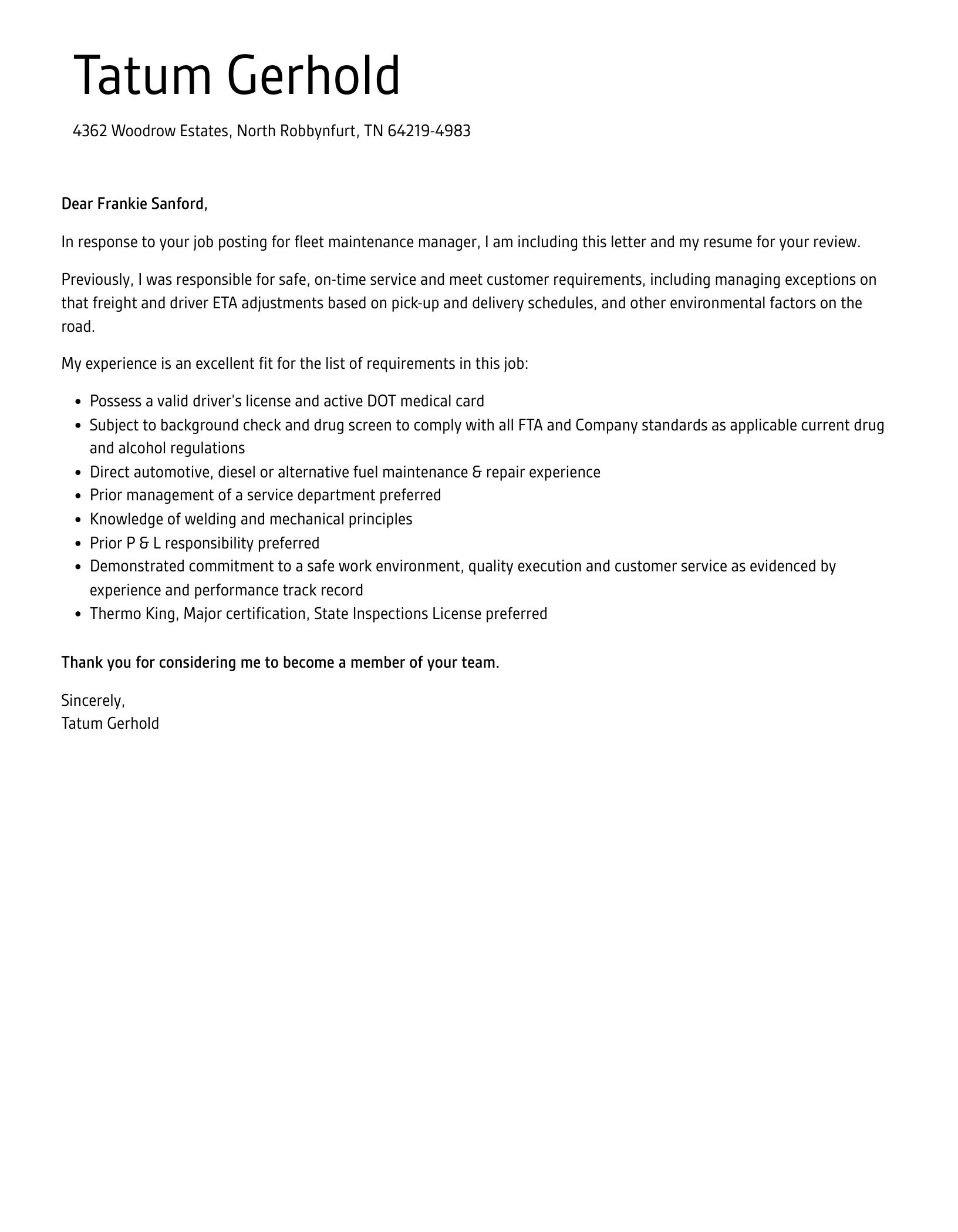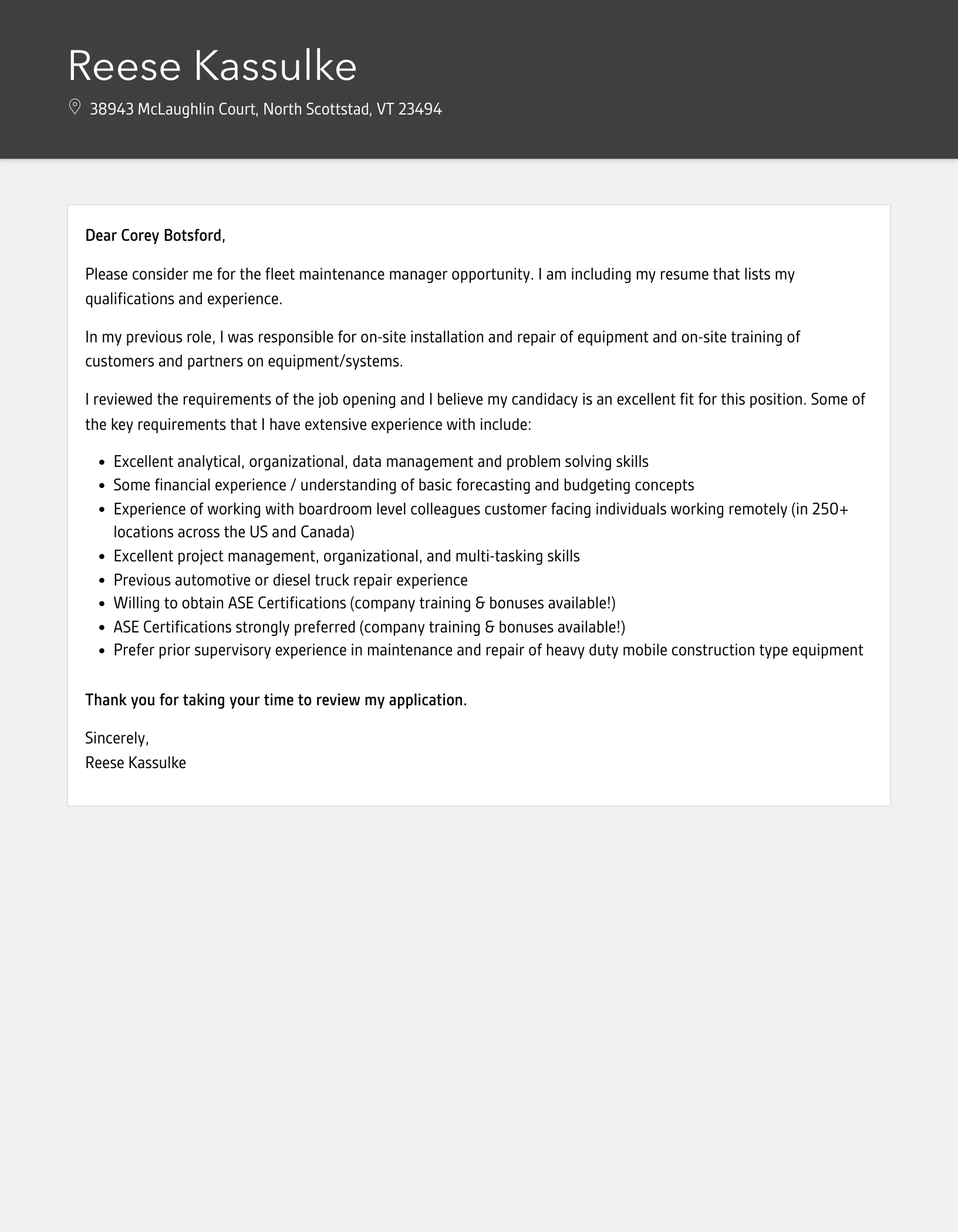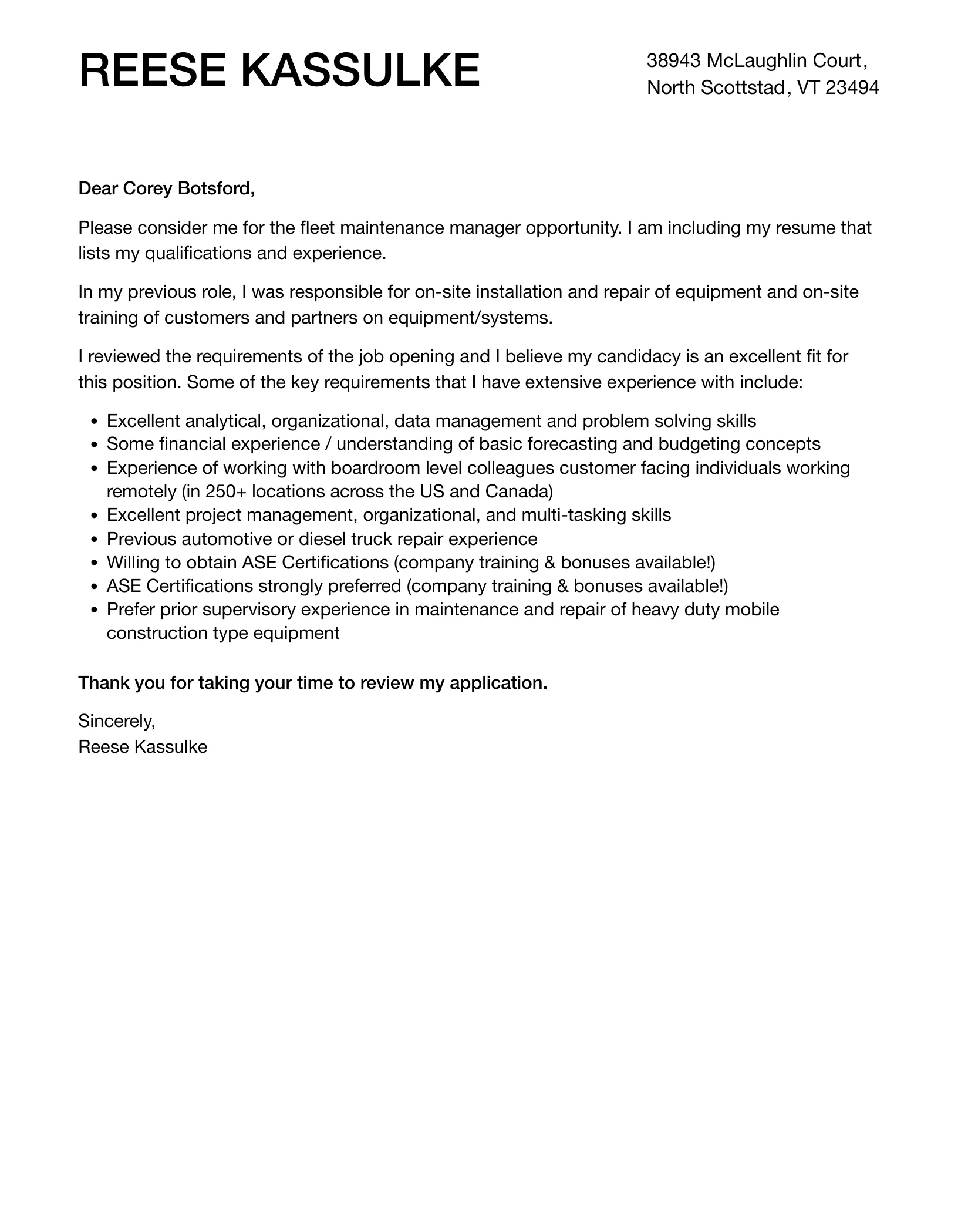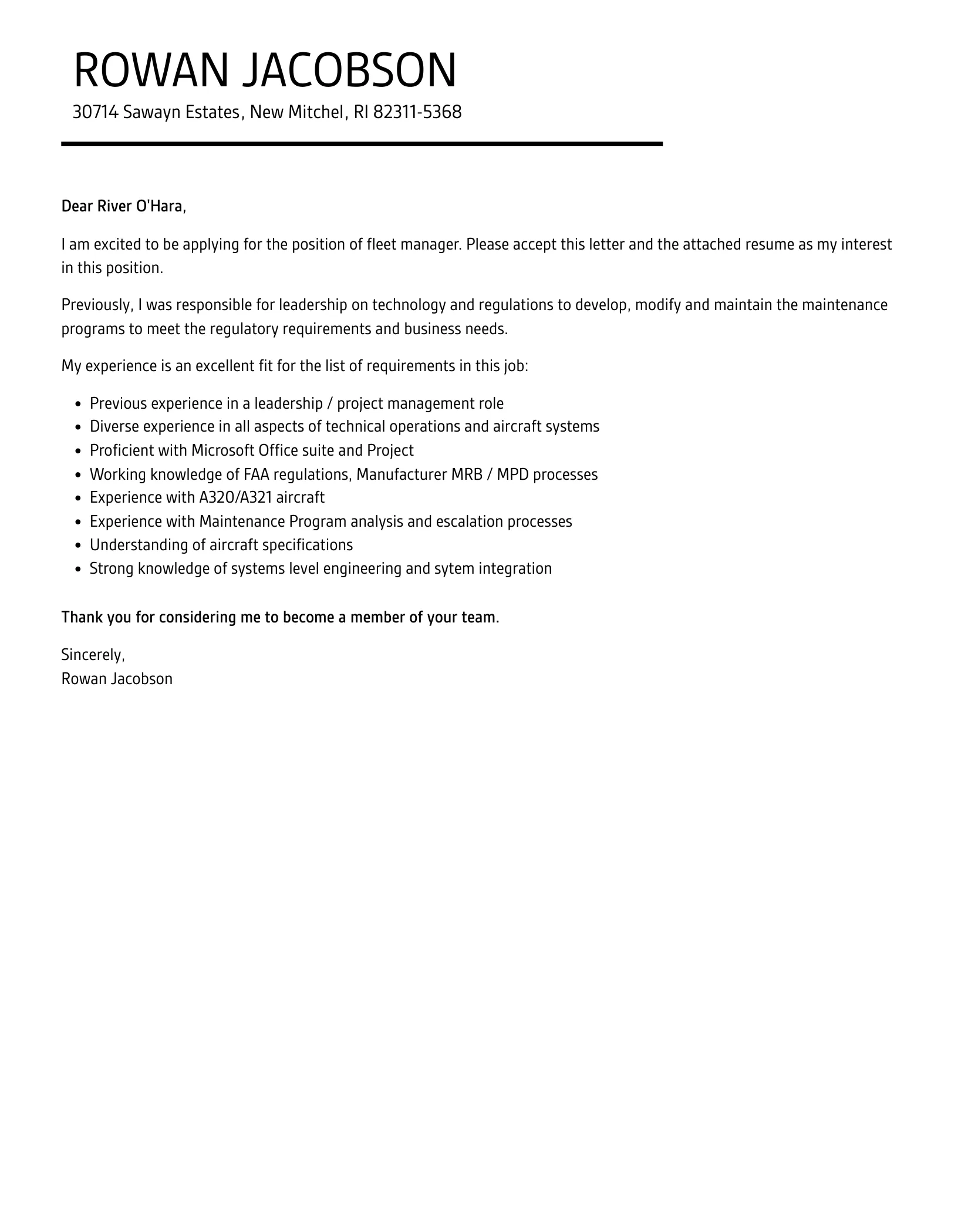Highlighting Your Expertise
A compelling Fleet Manager cover letter is your first chance to make a strong impression on a potential employer. It is more than just a formality; it is a crucial tool for showcasing your skills, experience, and passion for fleet management. The cover letter should be a concise summary of your qualifications, tailored to the specific job description. Start by clearly stating the position you are applying for and where you found the job posting. This immediately orients the reader and sets the context for your application. Focus on what makes you stand out and why you are the best fit for the role. Remember to highlight your understanding of the company’s needs and how you can contribute to their success. Demonstrating this understanding is key to capturing the hiring manager’s attention and making them want to learn more about you. Make sure that your expertise matches the needs of the specific role, as this will significantly improve your chances of getting hired.
Showcasing Relevant Experience
Detailing your relevant experience is essential in your Fleet Manager cover letter. Instead of simply listing past roles, focus on explaining what you accomplished in each position. Use the STAR method (Situation, Task, Action, Result) to structure your responses. Begin by briefly describing the situation or challenge you faced, then outline the task you were assigned. Explain the specific actions you took to address the issue, and, most importantly, quantify the results. Did you reduce operational costs by a certain percentage? Did you improve vehicle uptime? Did you streamline maintenance schedules? These are the types of achievements that will impress a hiring manager. When discussing your experience, highlight the key responsibilities and accomplishments that align with the requirements of the job description. The more relevant your experience, the more likely it is that you will make a lasting impression. Tailor your experience to match the needs of the hiring company.
Quantifying Achievements

Quantifiable achievements give concrete evidence of your abilities and the value you bring to an organization. Whenever possible, include specific numbers and percentages to demonstrate your impact. For example, instead of stating “Reduced fuel consumption,” write “Reduced fuel consumption by 15% through implementing a driver training program and optimizing routing.” Similarly, if you improved maintenance efficiency, mention the percentage increase in vehicle uptime or the reduction in maintenance costs. Quantifying your achievements transforms claims into verifiable facts and provides the employer with tangible results. This approach makes your cover letter much more compelling and demonstrates your ability to deliver results in a fleet management role. Remember to provide context and explain the measures you took to achieve those outcomes, providing the recruiter with a solid understanding of your expertise.
Tailoring Your Letter
A generic cover letter that is sent to multiple companies is usually not effective. Tailoring your Fleet Manager cover letter to each specific job application is essential for making a strong impression. Before you start writing, carefully review the job description and identify the key requirements, skills, and qualifications the employer is seeking. Use this information to customize your letter and highlight the experience and achievements that best match the job requirements. If the job description emphasizes experience with a particular type of vehicle or software, make sure to prominently feature those details in your letter. Researching the company is also essential. Understanding the company’s mission, values, and goals will help you to tailor your letter to show how your skills and experience align with their needs. Showing this kind of personalized effort and attention to detail will significantly increase your chances of getting hired.
Demonstrating Industry Knowledge
Your Fleet Manager cover letter should demonstrate a solid understanding of the fleet management industry. This includes not only the technical aspects of managing vehicles but also a broader perspective on industry trends, best practices, and challenges. This demonstrates that you are not just a manager, but also a strategic thinker and a valuable asset to the organization. Discuss your familiarity with industry-specific regulations, such as those related to safety, compliance, and environmental standards. Demonstrate your awareness of the latest technologies and trends in fleet management, such as telematics, electric vehicles, and data analytics. Your cover letter should reflect your knowledge and expertise, and show that you are current with the latest developments in the field. Highlighting these industry aspects will impress employers and set you apart from other candidates. Your goal is to convey that you have a comprehensive understanding of the complexities and nuances of the field.
Understanding Fleet Management

Showcase your understanding of the different facets of fleet management in your cover letter. Fleet management is a multifaceted role that encompasses various responsibilities, from vehicle acquisition and maintenance to driver safety and cost control. Highlight your experience in these different areas, such as vehicle selection, negotiation with vendors, and establishing preventive maintenance programs. Discuss your ability to develop and implement fleet policies and procedures that improve efficiency and reduce costs. Explain your experience with managing driver training and safety programs to ensure compliance with regulations and improve safety records. It’s also very important to demonstrate your ability to handle all aspects of fleet management, from administrative to strategic, to show that you possess the necessary skills and knowledge to excel in the role. Emphasize your holistic understanding of fleet management principles and your strategic approach to managing a fleet.
Familiarity with Software
Fleet management software is essential for any modern fleet operation. If you have experience with specific fleet management software platforms, make sure to mention them in your cover letter. Examples include solutions such as Samsara, Fleetio, or Geotab. If you have experience with the types of software platforms the company uses, this is a huge plus. Highlight your ability to use these tools to manage vehicle maintenance, track fuel consumption, monitor driver behavior, and generate reports. If you have experience with data analysis and reporting, mention how you use these skills to identify trends, make data-driven decisions, and improve fleet performance. Mention your experience with data-driven decision-making, as these can be important for reducing costs. Show your proficiency in the software used by the company and explain how you’ve used these tools to enhance fleet operations and reduce costs.
Navigating Common Challenges
Fleet managers frequently encounter various challenges, so your cover letter should illustrate your ability to address these. Discussing the challenges that you have successfully navigated in the past can demonstrate your problem-solving skills and your resilience. Show how you have handled issues such as rising fuel costs, vehicle downtime, driver turnover, and regulatory changes. Detail the specific actions you took to mitigate these challenges, such as implementing cost-saving measures, improving maintenance schedules, and developing driver retention programs. Also, highlight your proactive approach to anticipating and addressing challenges. For example, you could mention your involvement in risk management, safety compliance, and the development of contingency plans to address unforeseen issues. Demonstrate your strategic thinking and your ability to navigate complex situations to reassure the hiring manager that you are capable of handling challenges that arise in a fleet management role.
Managing Costs

Cost management is a critical aspect of fleet management. Your cover letter should describe your experience in controlling and reducing fleet-related expenses. Showcase your skills in budget management and cost analysis. Mention the steps you’ve taken to lower costs, such as negotiating favorable rates with vendors, implementing fuel-efficient practices, and optimizing vehicle utilization. If you have experience with cost-saving initiatives, emphasize those as they are very important to hiring managers. Highlight your ability to use data and analysis to identify areas where costs can be reduced and efficiency can be improved. For example, demonstrate how you’ve used data to optimize routes, reduce idling time, or improve maintenance schedules. Use quantifiable metrics to illustrate your success in managing costs. Your ability to manage fleet expenses effectively will immediately show a hiring manager how you can bring value to their company, and make you stand out.
Ensuring Safety and Compliance
Safety and compliance are top priorities in fleet management. Your cover letter should demonstrate your commitment to these areas. Highlight your experience in developing and implementing safety programs, conducting regular vehicle inspections, and ensuring compliance with all relevant regulations. If you have experience managing driver safety training programs, mention the actions you took to enhance safety records and reduce incidents. Your efforts can demonstrate a proactive and detail-oriented approach to risk management. Your ability to stay current with changing regulations and your efforts to provide safe operation will show that you are a responsible fleet manager. Show your focus on reducing accidents and ensuring compliance, as these are vital in fleet management and are very important to hiring managers.
The Art of Closing
Your cover letter’s closing is your final opportunity to make a lasting impression. It should be both professional and persuasive, leaving the employer with a positive impression. Reiterate your interest in the position and your enthusiasm for the company. Express your confidence in your ability to contribute to their success. If possible, tailor your closing statement to the specific company and the job description. For instance, if the job requires experience in a certain area, reference that particular skill or experience. Also, state that you would like the opportunity to discuss your qualifications further in an interview. Conclude with a polite and professional closing, such as “Sincerely” or “Respectfully,” followed by your name and contact information. Proofread your letter carefully before submitting it. Ensuring the accuracy and professionalism of your cover letter is vital to increase your chances of success.
